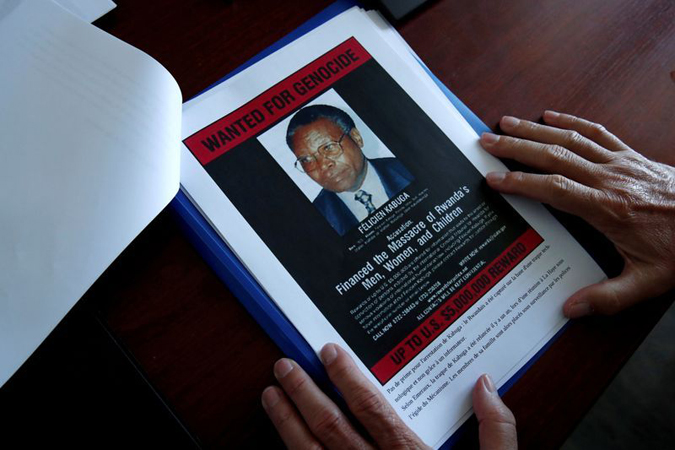 As dawn broke on May 16, an elite French police team blew open the door to an apartment in a sleepy northwestern Parisian suburb where they found Felicien Kabuga, suspected of bankrolling the genocide against Rwanda’s Tutsis in 1994.
As dawn broke on May 16, an elite French police team blew open the door to an apartment in a sleepy northwestern Parisian suburb where they found Felicien Kabuga, suspected of bankrolling the genocide against Rwanda’s Tutsis in 1994.
The arrest marked the end of a 26-year manhunt for Kabuga, who used 28 aliases and relied on powerful connections in both Africa and Europe to evade justice, investigators say. In the end, his health failing, he was protected by some of his 11 children, but it was these same ties that helped uncover his whereabouts.
Interviews with 14 security officials and diplomats shed light on how Kabuga managed to live undetected for so long, despite the fact he had a $5 million bounty on his head and was facing seven counts of genocide and crimes https://tinyurl.com/y9mrcuq2 against humanity for his alleged role in the slaughter of 800,000 ethnic Tutsis and moderate Hutus.
“It was a bombshell. Everyone had forgotten about him,” said Alain Gauthier who, with his Rwandan-born wife Dafroza, has tracked Rwandan genocide suspects for 20 years.
Investigators accuse Kabuga, 87, a one-time tea and coffee tycoon, of financing, arming and inciting Hutu militias. They also say he used a radio station that he had co-founded to fan ethnic hatred in Rwanda, a landlocked country in the heart of Africa.
Kabuga told a French court on May 27 that the charges laid against him by an international tribunal were lies. “I have not killed any Tutsis. I was working with them,” he said.
Kabuga was in bed in the flat in Asnieres-sur Seine, just a 25-minute drive from the Eiffel Tower, when the police burst in. At first he feigned confusion at an interpreter speaking Kinyarwanda, an official language of Rwanda. He responded in Kiswahili, a language spoken widely across central Africa. His name, he said, was Antoine Tounga and he came from the Democratic Republic of Congo.
But a scar on his neck from 2007 throat surgery, which was detailed in an Interpol red “wanted” notice, gave him away. Two hours later, a DNA test proved that Tounga was indeed Kabuga.
The octogenarian had undergone the throat operation in Germany and it is still not clear when he moved to France, where he is now known to have lived for at least four years.
“This was deeply embarrassing for us because he was here all this time under our noses. That reflects terribly on us,” said a French source close to the investigation.
FAMILY CIRCLES
Police said the third-floor apartment was rented out by his son, Alain Habumukiza, whose family name was on a letter box in the block’s foyer. Another son, Donatien Nshimyumuremyi, was in the flat when the police arrived. He is based in Belgium but moved to Asnieres during the coronavirus outbreak, presumably to take care of his father, investigators said.
Under French law, children cannot be charged for trying to protect their parents from arrest.
Two neighbours thought Kabuga had lived in Asnieres for three years. Another said as many as five. They described a discreet man who had become increasingly housebound.
“He was always accompanied by a younger man or woman, probably his children,” said one of the neighbours, who declined to be named. “He seemed weak, tired and had mobility issues.”
Court documents presented by Kabuga’s defence team and seen by Reuters show that he made at least 10 visits to the Beaujon hospital in northern Paris since 2016, always using the Tounga alias.
He received a brain MRI scan on Jan. 25 of that year and subsequently had scans to his stomach and colon. He underwent surgery twice in 2019, the documents show. One of his daughters would accompany him to translate, Kabuga’s lawyer said.
In a statement to reporters on May 29, Kabuga’s family said he had a colectomy last year and suffered from diabetes, hypertension and dementia.
After Tutsi rebels backed by the Ugandan army took control of Rwanda in July 1994, millions of Hutu fled and Kabuga initially went to Switzerland. At the time, there was no arrest warrant for him and he was allowed to withdraw money from a bank before heading to the Democratic Republic of Congo, said a legal source who has tracked his flight.
He was indicted by the International Criminal Tribunal for Rwanda (ICTR) in 1997. Investigators believed he was living in Kenya and Interpol repeatedly informed Kenyan police of locations where he had been sighted, a source in Europe said, but there is no record that any action was taken. The Kenyan government denied accusations by both the ICTR and Washington that the country was sheltering Kabuga.
In 2003, Kabuga was nearly captured after an associate, a Kenyan journalist called William Munuhe, tried to cash in on the US bounty by tipping off US agents to the fugitive’s location. But Munuhe was discovered dead in his house before he had a chance to contact the waiting US security team, and the trail subsequently went cold.
Kenyan police told Munuhe’s family at the time that he had died from carbon monoxide poisoning. But his brother Mureithi Munuhe said he was murdered to thwart the US-led operation.